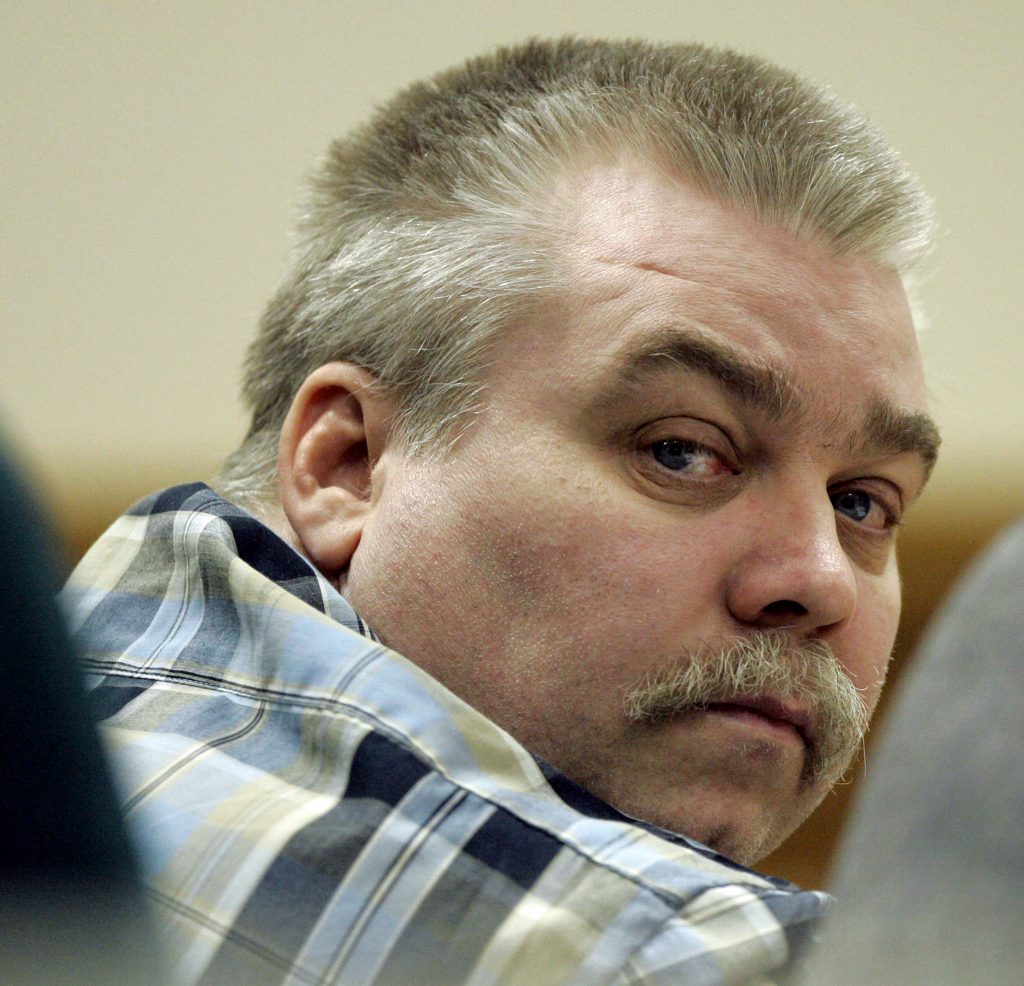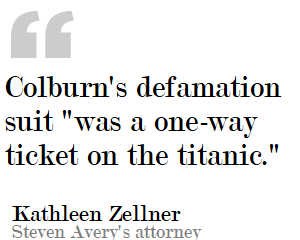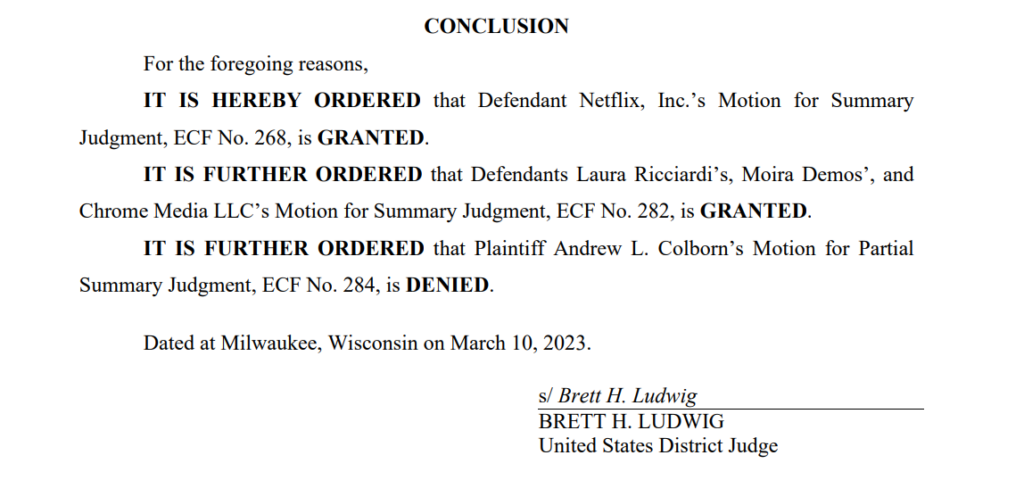Updated: ‘Making a Murderer’ defamation case against Netflix dismissed, summary judgment granted
By: Steve Schuster, [email protected]//March 11, 2023//
Updated: ‘Making a Murderer’ defamation case against Netflix dismissed, summary judgment granted
By: Steve Schuster, [email protected]//March 11, 2023//

By Steve Schuster
[email protected]
 On Friday, March 10, 2023, a defamation suit against Netflix and the “Making a Murderer” creators Moira Demos and Laura Ricciardi was dismissed when a U.S. District Court judge in Milwaukee granted two motions for summary judgment.
On Friday, March 10, 2023, a defamation suit against Netflix and the “Making a Murderer” creators Moira Demos and Laura Ricciardi was dismissed when a U.S. District Court judge in Milwaukee granted two motions for summary judgment.
U.S. District Court for the Eastern District of Wisconsin Judge Brett Ludwig granted the Defendants’ summary judgment motions and denied retired Manitowoc County Sheriff’s Andy Colborn’s partial motion for summary judgment, according to court documents obtained by the Wisconsin Law Journal.

The Netflix series “Making a Murderer” tells the story of Steven Avery, who is currently serving life in prison after being found guilty for the murder of Teresa Halbach. Halbach was murdered on Oct. 31, 2005. For the past 18 years, Avery has had a number of new criminal defense attorneys who have all been unsuccessful at his release. However, Avery’s attorney Kathleen Zellner remains optimistic that new evidence will prove her client’s innocence.
The Netflix series “Making a Murderer,” which originally aired in 2015, received criticism from the media, government officials and the general public for allegedly only telling one side of Avery’s story, revictimizing Halbach and her family, as well as incriminating law enforcement professionals. One of those law enforcement professionals was former Manitowoc County Sheriff’s Deputy Colburn, who sued Netflix for defamation.
The court ruled Friday that “Colborn has failed to prove the existence of any such improbabilities or inconsistencies. He has not even managed to show that the producers bore him ill-will, and that, in and of itself, is insufficient notice.”
Avery’s current attorney, Kathleen Zellner, tweeted twice about the ruling on Friday.

Avery’s former attorney, Jerome Buting, also tweeted about the ruling.

Ken Kratz, the former district attorney who was assigned to the Avery case, said he disagrees with Friday’s ruling.
“Shifting the burden to the defamed person to prove he didn’t plant evidence is, of course, an impossible standard. Courts continue to protect big media against any accountability for outrageous claims made in the name of entertainment. It’s time to overturn the NY Times vs Sullivan’s actual malice hurdle and recognize that real people, and their reputations, are being crushed in the process,” Kratz said during an interview with the Wisconsin Law Journal on Saturday.
In response to Kratz, Zellner said, “Colburn is the plaintiff in the case, of course he has the burden. Kratz sounds like a criminal defense attorney trying to talk about defamation.”
Zeller who was a consultant on the Johnny Depp defamation case said that this court decision was important.
“The decision affirms that we have freedom of the press in this country,” Zeller said during an interview with the Wisconsin Law Journal.
Zellner said Colburn’s case was doomed from the start.
“It was a one-way ticket on the Titanic,” she said.
“I think anyone in this country who is familiar with defamation law would think the court made the correct decision,” she added.
Zellner said the judge’s decision was “beautifully constructed.” The decision “was right on point. Clearly, the judge and his clerks spent a lot of time on this,” she said.
Kratz disagreed.
“I am disappointed, but I am but not surprised that Attorney Zellner would spike the ball knowing that ‘Making a Murderer’ effectively ruined the careers of two cops and one prosecutor,” Kratz said during an interview with the Wisconsin Law Journal Monday.
“The filmmakers intentionally presented false statements naming innocent cops as having planted evidence and innocent citizens of being killers without any shred of evidence,” Kratz said.
Meanwhile, Zellner contends that there is new evidence and there’s a big difference between defamation and harsh treatment.
“I think the court did a good job saying you can be treated harshly in a documentary, but it’s not defamation,” Zeller added.
“Can you imagine if lawsuits and the court had to wade through it if everything time something like this happened,” Zellner asked.
She says the case will likely serve as precedent for future court decisions and is confident that the case will not get overturned.
“There is no possible way this could be overturned on appeal. The judge was meticulous and really dealt with all of the facts,” she said.
Friday’s court ruling further states that “Colborn argues that Making a Murderer falsely implies that he committed criminal acts (planting evidence) and is thus defamatory per se. See Teague v. Schimel, 896 N.W.2d 286, 300 (Wis. 2017) (holding that falsely imputing commission of a criminal act is defamation per se). Defendants assert that Colborn’s case falls short for at least three reasons: (1) the implication that Colborn planted evidence is not reasonably conveyed and attributable to Defendants; (2) Colborn cannot prove that he did not plant evidence; and (3) Colborn cannot satisfy defamation by implication’s heightened actual malice standard. The first two arguments fail; a reasonable jury might find that Making a Murderer falsely implied that Colborn planted evidence. But because Defendants are correct that Colborn cannot show actual malice, this theory also fails.”
As previously reported by the Wisconsin Law Journal, in 2021 a federal judge had originally ruled in favor of Colborn. The previous ruling against Netflix stated that “Neither The Supreme Court nor the Seventh Circuit has ever suggested a speaker enjoys unconditional First Amendment immunity for making defamatory statements simply because the statements concern legal proceedings.”
Also as previously reported by the Wisconsin Law Journal, a new series, “Convicting a Murderer” is expected to air this summer. The new docuseries was actually made as a rebuttal to the original Netflix docuseries.
The Wisconsin Law Journal reached out to both Netflix and Christina Sommers, who represented Colburn, for comment.
“We do not have a comment,” said Erika Masonhall, a spokesperson for Netflix.
Sommers could be reached prior to publication.
Click here to view additional court documents.
This story has been updated.
Legal News
- Wisconsin attorney loses law license, ordered to pay $16K fine
- Former Wisconsin police officer charged with 5 bestiality felony counts
- Judge reject’s Trump’s bid for a new trial in $83.3 million E. Jean Carroll defamation case
- Dozens of deaths reveal risks of injecting sedatives into people restrained by police
- The Latest: Supreme Court arguments conclude in Trump immunity case
- Net neutrality restored as FCC votes to regulate internet providers
- Wisconsin Attorney General asks Congress to expand reproductive health services
- Attorney General Kaul releases update at three-year anniversary of clergy and faith leader abuse initiative
- State Bar leaders remain deeply divided over special purpose trust
- Former Wisconsin college chancellor fired over porn career is fighting to keep his faculty post
- Pecker says he pledged to be Trump campaign’s ‘eyes and ears’ during 2016 race
- A conservative quest to limit diversity programs gains momentum in states
WLJ People
- Power 30 Personal Injury Attorneys – Russell Nicolet
- Power 30 Personal Injury Attorneys – Benjamin Nicolet
- Power 30 Personal Injury Attorneys – Dustin T. Woehl
- Power 30 Personal Injury Attorneys – Katherine Metzger
- Power 30 Personal Injury Attorneys – Joseph Ryan
- Power 30 Personal Injury Attorneys – James M. Ryan
- Power 30 Personal Injury Attorneys – Dana Wachs
- Power 30 Personal Injury Attorneys – Mark L. Thomsen
- Power 30 Personal Injury Attorneys – Matthew Lein
- Power 30 Personal Injury Attorneys – Jeffrey A. Pitman
- Power 30 Personal Injury Attorneys – William Pemberton
- Power 30 Personal Injury Attorneys – Howard S. Sicula











